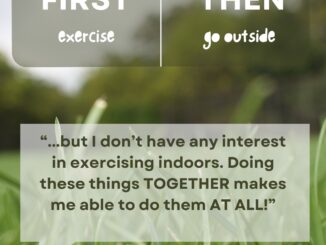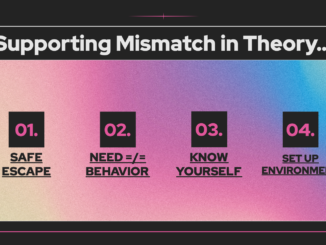If you are pursuing diagnosis for your neurodivergent child, it’s okay to take your neuro-affirming lens back “off” in order to talk to the doctor about your child.
What I mean is that you are not a bad parent or you don’t love your child less if you play the system by its own rules. You and I might both believe that your child is unique and magnificent and see their incredible strengths, we might know just how amazingly they can succeed and how far they can go with the right supports. But the time for that isn’t in pursuit of diagnosis.
It shouldn’t be this way. I’m talking from a pragmatic point of view, not an idealistic one. Believe me, there is a time and a place for education, for expanding and correcting and bettering the way the world treats our children, and some of that education needs to be directed at pediatricians and health visitors and other professionals and “experts”, too. I promise you that I’m right there with you on that.
But pragmatically speaking, you can hold to your principles and it might cause a pediatrician to assume that your child doesn’t fit a diagnosis because they only know a narrow stereotype. Or it might cause them to believe that things aren’t “bad enough” to rise to the level of “disorder”—and you and I might not believe that autistic brains nor ADHD brains are inherently disordered any more than anybody else’s, but right now, those things still are in the clinical diagnosing criteria.
I made one mistake of this sort during my son’s testing process for ASD. The doctor asked me, “How is his sleep?” and I said, “oh, it’s just fine, we don’t have any problems.” I was thinking about how it worked for our family and I was telling the truth—we didn’t have any problems, but at the same time, that leaves out a lot of critical information for the doctor.
I could also have said, “He happily goes in his room at about 7 and builds a complicated diorama out of toilet paper tubes and magnet toys for two or three hours before passing out right on the floor, and maybe wakes up at 4 to build for another hour or so before falling asleep again until school, so we just make sure he has water and turn off his light after he’s asleep and give him a night light and we sleep right across the hall from him so he can call out to us.” That would have clued the doctor in to the fact that yeah, his sleep pattern is not typical. Sleep is an area of difference.
It’s okay to say, “He doesn’t play with other peers,” even if you’re thinking, “well he’s always building amazing things by himself and he’s so clever and interested in things other 4 year olds don’t care about.”
It’s okay to say to the doctor, “Yeah, they haven’t been able to learn to use the toilet at all,” even if what you’re thinking internally is, “We haven’t even tried toilet ‘training’ because I believe children will show signs of readiness later on, and I’m following their lead.”
It’s okay to say, “She still sucks her thumb,” even if you’re thinking to yourself, “we’ve never tried to force her to stop, how can we when it’s attached to her? We don’t believe in that.”
It’s okay to say, “He has trouble with hitting and shoving at his daycare or kindergarten” even if you’re thinking “it’s the adult’s job to block it”— because your child is having extra difficulty with peer interactions.
It’s okay to say, “She comes home from school and cries and screams about whatever little thing sets her off,” even if you’re thinking, “Lots of kids have after-school restraint collapse; I know she’s exhausted from holding it in all day, and I know how to help manage it by getting her a snack and watching a show.”
If you want to explain the positives, that’s understandable. Just consider that the 2nd part of what you say. It’s okay to say the “negatives” first and perhaps stronger than you would otherwise. That might be easier if you bring another parent, or another trusted support person, to the doctors appointment so they can wait in the waiting room while you speak candidly with the doctor in ways you wouldn’t in front of your child. Or call the doctor ahead of time and ask to have a phone meeting where you say these types of things.
I have heard countless stories of parents pursuing diagnoses for children and being turned away by doctors whose knowledge was limited and whose exposure to neurodiversity-affirming practice might be literally zero. And sometimes the system will let you down even if you do all you can. But it’s okay to try. It’s not okay that the world is like this, but that doesn’t reflect on you and the way you have to jump through the world’s hoops. It doesn’t make you a bad parent to play by the rules of the “game” the way it is right now, even as we try to change the world for the future.



